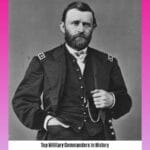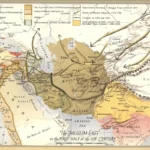Journey into the annals of military history with “Legendary Military Commanders and Their Battles: A Historical Analysis.” We delve into the lives and strategies of iconic leaders who shaped the course of history. From Alexander the Great’s audacious conquests to Hannibal’s tactical brilliance and Napoleon’s military genius, this article unravels the intricacies of their pivotal battles, offering insights into their leadership, decision-making, and the enduring impact they left on the world.
Key Takeaways:

- Francisco Pizarro’s small force conquered the vast Inca Empire.
- Hernán Cortés’s Spanish conquistadors defeated the mighty Aztec Empire.
- Joshua led the Israelites to victory after Moses.
- Leonidas’s Spartans fought bravely at Thermopylae against overwhelming odds.
- Themistocles shaped Athens and led the victory at Salamis.
- Belisarius’s Byzantine victories against the Persians were legendary.
- Khalid ibn al-Walid, a Muslim commander, had a remarkable undefeated record.
- Maurice of Nassau advanced warfare with siege engineering.
- Gustavus Adolphus revolutionized tactics and weapons with his Swedish army.
- John Jervis’s naval victory at Cape St. Vincent was decisive.
- Mikhail Kutuzov’s scorched-earth policy defeated Napoleon’s invasion of Russia.
Legendary Military Commanders and Their Battles: A Historical Analysis
Throughout history, the battlefield has been a crucible that has forged the legends of extraordinary military commanders. These individuals, through their brilliance, audacity, and unwavering leadership, have shaped the course of human civilization.
Alexander the Great: Master of Conquest
Alexander’s lightning-swift campaigns and innovative tactics transformed the ancient world. His victory at Gaugamela shattered the Persian Empire and established his dominance in the Middle East.
Julius Caesar: Architect of Empire
Caesar’s military genius is undeniable. His decisive victory at Pharsalus secured his power in Rome, and his siege of Alesia crushed the Gallic rebellion, cementing his legacy as a master strategist.
Napoleon Bonaparte: Emperor of Europe
Napoleon’s audacity and tactical brilliance propelled him to the heights of power. His victory at Austerlitz humbled the Austrian and Russian armies, making him the most feared general in Europe.
Erwin Rommel: The Desert Fox
Rommel’s cunning and daring in the North African desert earned him the nickname “The Desert Fox.” His defensive stand at El Alamein against overwhelming odds epitomizes his tactical prowess.
Douglas MacArthur: Liberation of the Philippines
MacArthur’s leadership was instrumental in the liberation of the Philippines during World War II. His bold amphibious assault on Leyte Gulf turned the tide against Japanese forces in the Pacific.
These legendary military commanders continue to inspire and fascinate us with their strategic insights and battlefield triumphs. Their battles are enduring testaments to the transformative power of human ingenuity and determination on the battlefield.
When it is about the greatest military commanders of all time, Alexander the Great is one of the most recognizable names. His bravery and leadership are unmatchable. However, there are many more top military commanders in history who have also made their mark. Their strategies were brilliant and their victories speak for themselves. If you are interested in military history, you might also want to know about the greatest military strategists of all time. Their ideas and tactics have influenced the outcome of many battles.
Julius Caesar:
As we delve into the annals of military history, it’s impossible to overlook the legendary figure of Julius Caesar. His tactical acumen, strategic brilliance, and relentless determination reshaped the Roman Republic, forever etching his name in the pantheon of military masterminds.
Caesar, the Conqueror:
Julius Caesar rose to prominence during the Gallic Wars (58-51 BC), a series of campaigns that brought vast territories under the Roman banner. His legions, renowned for their discipline and organization, employed innovative tactics and weaponry, leaving an enduring legacy on military warfare.
Civil War Triumphs:
In the ensuing Caesar’s Civil War (49-45 BC), Caesar pitted his legions against the forces of his political rivals, Pompey the Great and others. Through audacious maneuvers and decisive victories at battles like Pharsalus and Alesia, Caesar emerged triumphant, cementing his control over Rome.
Key Takeaways:
- Military Genius: Caesar’s brilliant tactics and innovative strategies revolutionized military warfare.
- Undying Leadership: His charisma and inspirational leadership inspired legions to fight with unwavering loyalty.
- Legacy of Conquest: Caesar’s campaigns expanded the Roman Empire, shaping its political and cultural landscape for centuries to come.
Citation:
Peterson, Dee. “Julius Caesar: Europe’s Greatest Military Commander?” Military History Matters, no. 106, June 14, 2019.
Napoleon Bonaparte: Military Genius and Strategic Mastermind
Born to Lead
From humble beginnings, Napoleon rose to command the French army, leading it to a series of astonishing victories across Europe. His brilliance in planning, audacity in execution, and unwavering determination on the battlefield earned him the title of “The Emperor of Europe.”
A Master of Tactics
Napoleon’s military strategies were nothing short of revolutionary.
- Artillery Prowess: He employed artillery with devastating effect, breaking enemy lines and demoralizing troops.
- Mobility and Maneuver: His armies moved with unmatched speed and precision, catching enemies off guard and exploiting their vulnerabilities.
- Centralized Command: Napoleon streamlined communication and decision-making, ensuring swift and efficient execution of his plans.
Key Battles
- Battle of Austerlitz (1805): A decisive victory over Austria and Russia, cementing Napoleon’s dominance.
- Battle of Jena-Auerstedt (1806): A crushing defeat of Prussia, establishing French supremacy over much of central Europe.
- Battle of Borodino (1812): A costly but ultimately inconclusive battle against the Russian army.
- Battle of Waterloo (1815): Napoleon’s final defeat, marking the end of his reign and leading to his exile.
Key Takeaways:
- Napoleon was a military visionary whose strategies transformed warfare.
- His brilliance in tactics and leadership earned him a reputation as one of the greatest commanders of all time.
- Despite his final defeat, Napoleon Bonaparte‘s legacy as a military genius continues to inspire and fascinate.
Citation:
- Chandler, David G. “Napoleon.” Encyclopedia Britannica, January 20, 2023.
Erwin Rommel and Douglas MacArthur: Legendary Military Commanders
Erwin Rommel
The Desert Fox
Erwin Rommel, known as the “Desert Fox,” was a German field marshal who played a significant role in World War II. His brilliant strategies and bold tactics earned him both admiration and fear on the North African battlefields.
Notable Accomplishments:
- Defended Tobruk against overwhelming odds, earning him the nickname “The Butcher of Tobruk”
- Led the Afrika Korps to numerous victories in the North African desert
- Known for his innovative tactics, including the use of deception and armored formations
Douglas MacArthur
The General of the Philippine Army
Douglas MacArthur was an American general who served in World War I, World War II, and the Korean War. His unwavering determination and military prowess played a crucial role in the liberation of the Philippines from Japanese occupation during World War II.
Notable Accomplishments:
- Led the United Nations forces in the Korean War
- Played a key role in planning and executing the invasion of Normandy during World War II
- Served as Supreme Commander of Allied Forces in the Pacific during World War II
Key Takeaways:
- Commanders’ Brilliance: Both Rommel and MacArthur exhibited exceptional military leadership and strategic thinking, enabling them to achieve remarkable victories.
- Tactical Ingenuity: Rommel’s innovative tactics in desert warfare and MacArthur’s use of amphibious landings demonstrated their ability to adapt and overcome challenges.
- Leadership and Determination: Rommel’s unwavering resolve inspired his troops, while MacArthur’s leadership and determination were instrumental in liberating the Philippines.
Citation:
- Military History Encyclopedia: Erwin Rommel
- History.com: Douglas MacArthur










